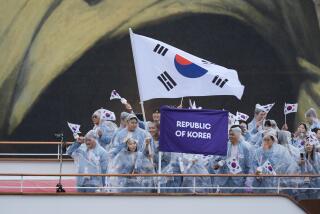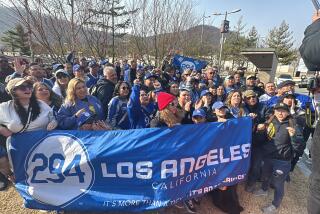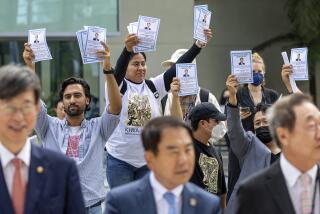Anti-U.S. Crowds at Olympics Just Cheerleading ‘Diplomats’
- Share via
TOKYO — Remember those South Korean crowds at the Seoul Olympics cheering for teams from Communist countries in matches against the Americans?
A South Korean executive said here Friday that they were “cheerleaders” organized by the Federation of Korean Industries at the urging of the South Korean government.
Choi Chang Nak, deputy executive director of the federation, made the disclosure at a symposium on international economic issues sponsored by the Japanese newspaper Yomiuri.
Asked about the displays of anti-Americanism, Choi said that Chinese, Soviet and East European visitors were “very important guests to our country,” which at the time of the Olympics had no diplomatic relations with any Communist country.
“Therefore,” he said, “we made behind-the-scenes arrangements to give these visitors special treatment. Special groups of people were organized to cheer for them.”
Unaware of the diplomatic motive behind the “cheerleading,” American reporters spread the word that their allies, the South Koreans, were cheering for Communist teams, Choi said.
He insisted, however, that anti-Americanism in South Korea is limited to “very small bands of radical students and activists.”
In remarks after the symposium, Choi said that the business federation, at the urging of President Roh Tae Woo’s government, arranged for individual Korean companies to send groups of their employees to sports sites to cheer the Communist teams.
Government-organized crowds of more than 1 million mobilized to welcome American Presidents are legend in South Korea. But Choi’s remarks were the first assertion that the Seoul government had manipulated cheering at the Olympics.
Since assuming office in February, 1988, Roh has made it a policy to promote relations with Communist nations in an effort to prevent a confrontation with Communist North Korea, which boycotted the Games.
On Feb. 1, Hungary became the first Communist country to establish full diplomatic relations with Seoul. The Soviet Union, Yugoslavia, Bulgaria and Poland have set up trade offices in the South Korean capital.
More to Read
Go beyond the scoreboard
Get the latest on L.A.'s teams in the daily Sports Report newsletter.
You may occasionally receive promotional content from the Los Angeles Times.






